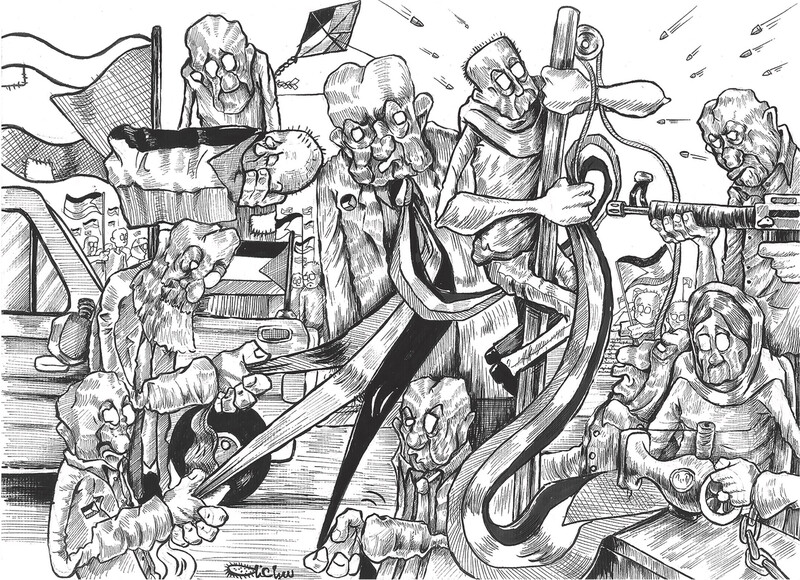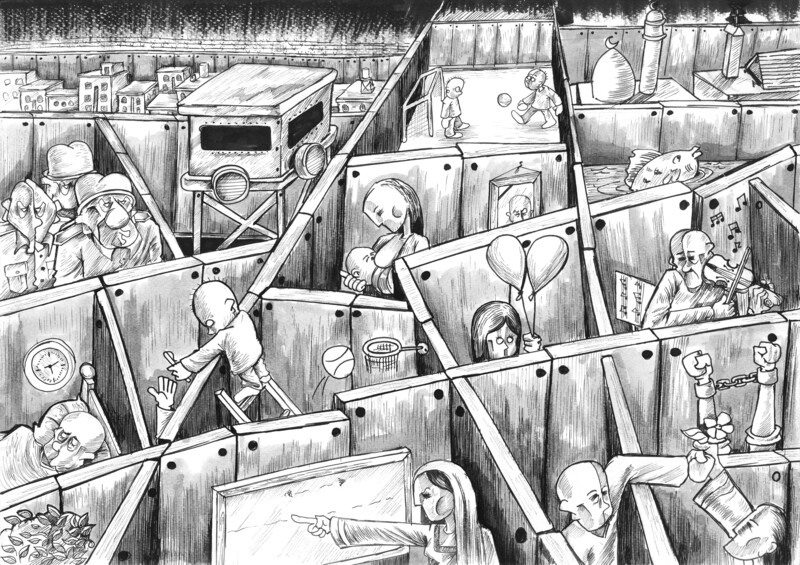The Electronic Intifada 4 May 2017

Palestinian culture is in itself a dangerous act, a reason to be caged.
So suggests a cartoon in a new anthology of work by Mohammad Sabaaneh.
The panel shows a group of men and women in traditional dress dancing the folkloric dabke while shackled together. A checkpoint cuts through the line dance, and Israel’s wall stops them short.
Here, the message seems to be, even celebrations are fraught with obstacles brought on by the Israeli occupation.
White and Black: Political Cartoons from Palestine, published by Just World Books, offers a rare opportunity for English-language readers to become familiar with Sabaaneh’s stark black and white images, printed in newspapers across the Arab world.
These political cartoons are foremost a form of solidarity with ordinary Palestinians in their daily struggle for survival and ongoing battle for justice.
Most of the cartoons are saturated with action and iconography.
One features the Palestinian flag prominently in a number of ways. A woman sews a flag with a sewing machine, while a man removes the same flag from a flagpole. Another man wears the flag as a tie, and three men pull the flag into three separate strips below him. People hold flags in the background, a kite bearing the flag flies in the air, and a man cradles a child (perhaps dead) draped in the flag.
Pregnant with meaning
The result is almost claustrophobic. It is certainly dense: every tiny detail is pregnant with meaning.
Sabaaneh said such density is a reflection of Palestinian life.
“This crowded cartoon reflects our lives in Palestine, the limited land, and our limited city,” he told The Electronic Intifada. “My blank paper looks like [Palestinian] cities surrounded by limits and I should put everything in this limited area.”
The cartoons in White and Black were created under exceptional circumstances.
According to Sabaaneh, he conceived of the book in 2013 while in solitary confinement in an Israeli prison.
Sabaaneh had been charged with collaborating with Hamas after his brother, who Israel has accused of being a member of the party, wrote and published a book on Palestinian political prisoners that included some of Sabaaneh’s art. He was imprisoned for five months.
Sabaaneh made an appearance at this year’s Pen America World Voices Festival. The timing is noteworthy: this is the first festival since PEN America dropped Israeli government sponsorship for the event. The appearance is one of many Sabaaneh is making during a US tour concluding in mid-May.

“The seeds, the idea of this book came from inside an Israeli prison and that’s why I must support [the] 1,500 Palestinian prisoners [on] hunger strike,” Sabaaneh told The Electronic Intifada, referring to the open-ended mass hunger strike launched in Israeli jails on 17 April.
Sabaaneh insisted he is critical of all Palestinian political parties, including Hamas, Israeli charges notwithstanding. In 2013, after his release from prison, he told The Electronic Intifada that “Hamas hates me” for a cartoon critical of Ismail Haniyeh, the former Gaza leader of the Islamist movement.
Palestinian Authority leader Mahmoud Abbas also ordered an investigation into Sabaaneh after he was accused of depicting the Prophet Muhammad in one of his drawings.
Sabaaneh, however, said that was just a pretext.
“The main reason was because I criticized some leaders of the Palestinian Authority,” he told The Electronic Intifada. “In my opinion, if you want to support Islam and Muslims, you should talk about [Islamic] philosophy and dig deep into Islam.”
Prisoners’ daily reality
Particular imagery is repeated throughout Sabaaneh’s work. Israel’s massive concrete wall is a frequent icon, as are caged birds, Dalí-esque melting clocks, and photos of martyrs.
Palestinian sacrifice is also shown in a sympathetic light. The liberation struggle, however, is not glorified.
In many of the cartoons, Sabaaneh portrays prisoners as mouthless. “That reflects the hunger strike,” he said. “We don’t need to talk … we want action to liberate our land.”
While Sabaaneh was in Israeli detention, he drew a series of cartoons about the experience; these are showcased in a chapter of the book.
Sabaaneh portrays prisoners in their daily reality, as opposed to romanticizing them.
These images are particularly visceral. In the introduction to the book, Sabaaneh says he felt no beauty while in prison, either through his jailers or through those imprisoned with him.
The former, Sabaaneh notes in his book, could not be drawn “aesthetically pleasing … even when I acknowledge that in the process of exerting his political will, the occupier is also occupied.” The drawings from this time reflect this through depictions of lumpy, misshapen bodies, dilapidated jail cells and terror-filled eyes.

While centered on the Palestinian prisoner experience, these drawings also speak to universal themes of injustice.
One cartoon, ironically subtitled “Scales of ‘Justice,’” portrays the traditional set of scales associated with the law. But here its column is sharply bent at an angle and the scales on either side of the beam are suspended in the air, implying a system in which justice is impossible.
Another depicts an Israeli judge – signified as such as he sits atop a lectern with the Scales of Justice adorned with a Star of David – saddled and ridden by an Israeli soldier, who chokes the judge with a set of reins. The soldier controls the gavel in the judge’s hand with a rope and waves it menacingly at a shackled prisoner below. Military rule supersedes fair trial.
Sabaaneh’s work also taps into Palestinian despair with the ongoing “peace process.”
An emotionally palpable drawing envisions Israel’s wall truly as an open-air prison that separates Palestinians into tiny, individual cells. People go about their lives as best they can in each cell – a little girl holds balloons, a man plays a violin, a woman breastfeeds her child – and some even manage to reach over the walls and hand a gift to their neighbors.
But these small acts of normalcy do not change their fundamental lack of freedom.
Sabaaneh’s cartoons are a bold and searing look at the lives of Palestinians and the collective burden they bear and violence they suffer from Israel’s occupation.
They have also gotten the artist into a heap of trouble – and that alone is reason to pay attention.
Listen to an extended interview with Mohammad Sabaaneh on The Electronic Intifada podcast.
All images by Mohammad Sabaaneh, courtesy of Just World Books LLC.
Marguerite Dabaie is a Palestinian American illustrator and cartoonist based in Brooklyn, New York. Her work can be found at www.mdabaie.com.





